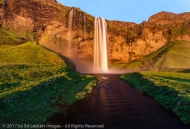
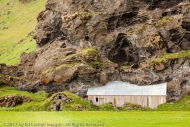
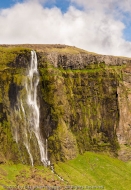
This week we’ll continue our anticlockwise (as the Aussies say) trip around Tasmania, the beautiful island state south of the Australian mainland. We began our trip in the capitol city of Hobart in the first article, Where the Devil is Tasmania, visiting places such as Freycinet National Park and its stunningly beautiful Wineglass Bay. Last week in Northeast Tasmania we headed to the remote beaches on the northest of the island, where we visited more beautiful beaches, a lighthouse, and found some really cool looking birds. And, of course, at the farthest point from civilization that you can go in that direction on some really challenging roads, I woke up the next morning to a flat tyre (as the Aussies would spell it).
So, after another delicious breakfast of maple flavored oatmeal and instant coffee, I pulled everything out of the trunk, where I found a perfectly inflated full size spare tire and jack. I replaced the tire without any drama, and not knowing how many other sharp rocks were already embedded in the other three tires, I decided to head back to the land of sealed (paved) roads as quickly and carefully as possible. This took me to the cute little town of Derby, the closest place of any size, where I found a wonderful little coffee shop slash museum slash gift shop to have lunch and hang out while my tire was being patched right down the street.
OK, feeling much better with a good spare in the trunk again, it was time to figure out which way to go. Do I continue west, or do I backtrack to the east to a hotel I had heard about that offered camping and hot showers for the equivalent of about $5. There were waterfalls back that way, and I needed a shower, so the choice was easy. I “checked in” to the historic Weldborough Hotel, paid my $7 AUD and chatted with the couple who owned it for a while. Like so many places I saw in Tasmania, this place was for sale. It seems they have grandkids in the US and Europe, if memory serves, and they want to move closer to them. Anyway, the husband highly recommended a nearby hike to me, and while I wasn’t that excited about it, he was so passionate about it that I would have almost felt guilty not going. Since it was still fairly early in the day, I figured I could do that and one of the waterfalls as well.
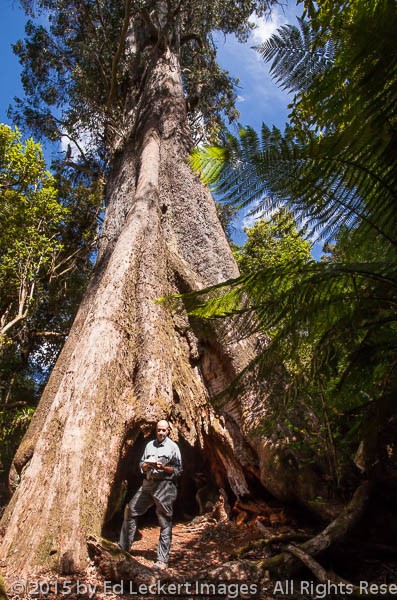
Ed signs the logbook at the Blue Tier Giant, the widest living tree in Australia, in Tasmania, Australia.
His suggestion was in the Blue Tier Forest Reserve on a lesser known walk, the Blue Tier Giant or ‘Big Tree’ walk. The walk descends through huge eucalypts, musk, myrtle, mosses and ferns to the Blue Tier Giant, the widest living tree in Australia, with a girth measuring an amazing 64 ft (19.4 m). The thing is so big that you step inside it to find and sign the logbook, which I did as you can see in the photo. Oh, and the wonderful thing about hiking a lesser known walk is that you get to clear all of the spider webs with your face. While not deadly, Tasmania does have some spiders that I would prefer not to have bite me in the face. But in the end, it was a good hike.
The next hike was to one of the waterfalls I had noted early in my planning, since the walk is on the list of Tasmania Parks and Wildlife Service’s 60 Great Short Walks that I used as a primary planning guide. Saint Columba Falls is a nearly 300 ft high (90 m) waterfall that flows consistently year-round and is one of the highest falls in Tasmania. As a bonus, I had the place almost to myself!
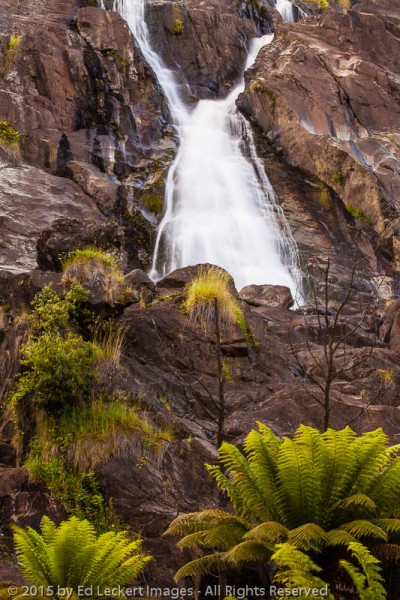
Ferns decorate the landscape as two cascades join on the way down Saint Columba Falls, in Saint Columba Falls State Preserve. Tasmania, Australia.
On my way out from the falls I passed a place called the Pub in the Paddock, which also served as the Saint Columba Falls Hotel and invited visitors to “Come & meet our beer drinking pig”, and serving Lunch, Dinner, Snacks, Cakes, & Coffee. Well, who could pass that up, right? So I stopped in just in time to catch the bartender feeding the pigs out in the barn, but apparently the pig was not in a drinking mood, so I didn’t get any pictures of that sort of event. You can see some here if you really need to see this. Anyway, she was just finishing up the feeding, so we walked in together to a bar full of friendly locals. They all looked like farmers, and were having a great time, and treated me very well, too, but darned if that wasn’t one of the hottest bars I’ve ever been in. A little ventilation would have gone a long way, but after about five minutes it was no longer my problem.
Soon I headed back to my hotel campground and set up the tent. The hotel was also a pub, so I ordered the steak sandwich special that the wife makes and waited at a picnic table out in the back yard for it to arrive. I have to say, this was one of the best, most tender steak sandwiches I’ve ever had.
The next morning after a delicious breakfast of, you guessed it, maple flavored oatmeal and instant coffee, it really was time to head west. I was getting back into wine country, so I stopped in at one winery along the way. Well, not exactly on the way, since you have to wind your way onto progressively smaller unsealed (gravel) roads until you get to a long driveway, where you park your car and this guy comes running out of the house, putting on his boots in a hurry so he can meet you at the tasting room. Did I mention this was tourist season, and I had the place to myself? The guy had some nice wines, so I bought a bottle of the area’s specialty, Pinot Noir. This bottle will come into play in a future article.
So I decided to head to Launceston, the second largest city in Tasmania, and play urban tourist for a bit. I found a great little restaurant right on the water and chatted with the bar owner, who sat down beside me at the bar to watch a nationally televised soccer or cricket match, I don’t remember which. But apparently his son was one of the players. What I do remember is that I had some delicious raw oysters. While in Tasmania I made a habit of starting as many meals as I could with oysters.
With the help of a mobile phone app, I found a budget inn called the Batman Fawkner Inn for the night. Really! Well, this stately building was built in 1824 right in the heart of all things interesting in Launceston, but that’s not always a good thing. Remember, this is summer, and it was particularly hot that day, and with no air conditioning, the windows must be kept open (unless you’re in the Pub in the Paddock, where it’s OK to sweat while you drink). Well, there’s a nice old church next door, and you know what nice old churches have, right? Exactly! They have church bells, and those bells go off every fifteen minutes around the clock, just in case your mobile phone battery has died and you desperately need to know the time at 3:30 in the morning. Oh, and since the hotel car park was next to the night club entrance, I had some interesting graffiti drawn into the dust on my back window the next morning. I’d love to show you a picture of it, but this is a family blog.
Heading out of town, groggy as all heck from lack of sleep, my first stop that day was Liffey Falls, another 60 Great Short Walks destination. The sandstone steps make a beautiful platform for the falls to run over.
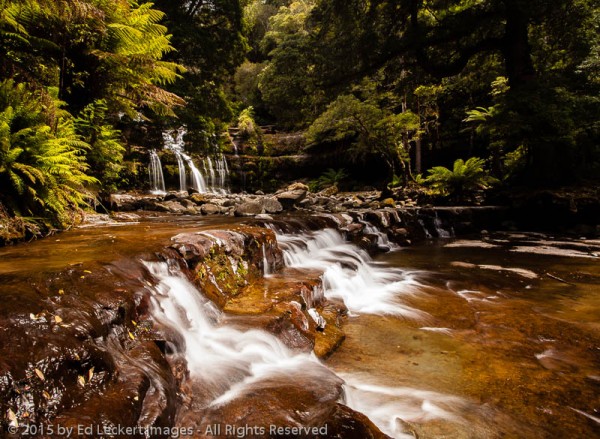
Water collected on the Great Western Tiers washes into the Liffey River. As it rushes downslope it erodes away the softer mudstone sediments exposing sandstone steps. These give rise to a series of waterfalls culminating in Liffey Falls, in Liffey Falls State Reserve, Tasmania, Australia.
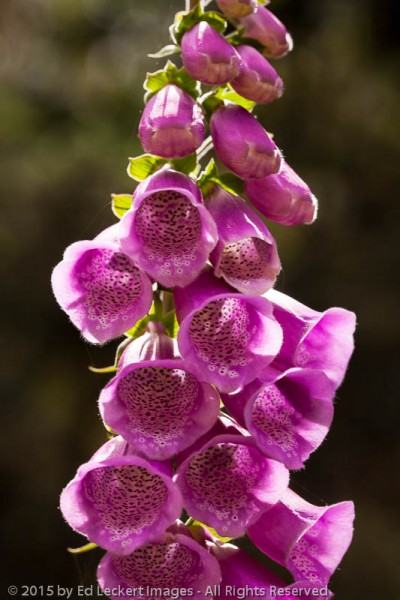
Common foxglove grows like a weed on the side of the road, because it is one! A biennial herb with a rosette of soft, blue-grey hairy leaves that produces a tall flower spike of white, pink or purple tubular flowers with dark mottling, it invades wet forests, riparian and alpine areas, where it replaces native herbs. Extremely toxic to livestock and humans.
At some point I started to notice that a purple flower was growing almost everywhere along the side of the road. It reminded me of the Scotch broom that lines our highways back in the US, and it should, because both are invasive weeds. But, the flowers were too good to pass up, so I stopped along a small unsealed road and took my time composing some shots. As usual, no cars passed the entire time I was shooting.
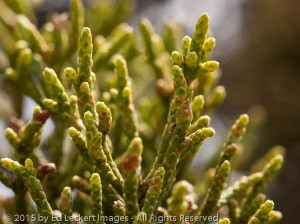
Pencil pines are one of the most frost-resistant trees in Australia. Look closely and you will notice that the leaves are reduced to small scales which wrap tightly around the branchlets to reduce heat and moisture loss, making them extremely hardy.
Next I headed to Pine Lake to see the famous Pencil Pine trees, a very hardy tree that thrives in the harsher conditions that windy, higher altitude locations provide. Their leaves are small scales that seal in heat and moisture.
But, eventually a tree’s time is up, and this bleached out specimen’s time has been up for quite some time. I found it to be particularly interesting, with that large hole in the trunk and the corkscrew, twisty shape overall. It doesn’t look like it, but the Pencil Pine is in the same family as our giant California Sequoias.
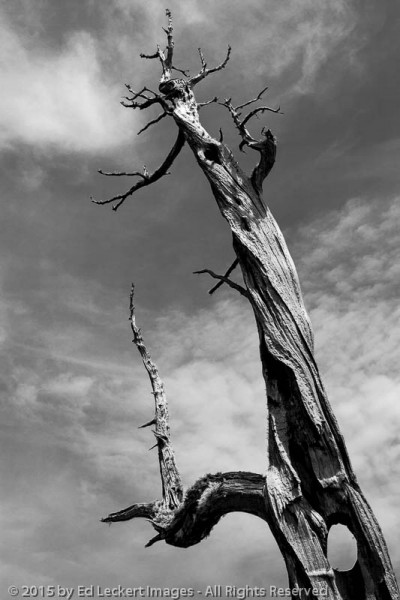
Pencil pines are found only in Tasmania but they belong to the same family as the tallest tree in the world, the giant Californian Sequoia. They have their origins on the southern continent of Gondwana and are among the great survivors of aeons of ravaging change – except for this one, at Pine Lake, Great Western Tiers Conservation Area, Tasmania, Australia.
Well, it was time to figure out where I was staying that night, and I wanted to be reasonably close to Cradle Mountain Lake St. Clair National Park so I could get an early start the next morning. I ended up camping in the grass at a place called Gowrie Park Wilderness Village, and this was the first time I really had to look hard to find a spot for my tent where there was no wallaby poo. But everybody there was friendly, as usual, and I ended up chatting with a couple at dinner who were there celebrating their anniversary. She was a manager for the national park service, and assured me that I was not the first person to sprain my ankle hiking down to Wineglass Bay (that’s another story). Of course they gave me the usual grief about being an American, but by this point I would have been disappointed if they hadn’t!

Great newsletter, Ed! I especially love your pic of Liffey Falls. Beautiful!
Thanks, Lorraine!
Good to see you doing good Ed. Great photos as always
Thanks, Joe! We should go hiking soon!
I like your tradition of starting each meal with oysters — a find tradition — I shall follow in your footsteps!
Great news letter Ed! I like to take photos of dead snags too.
Max
Thanks, Max! Dead snags against the right sky are great fun!